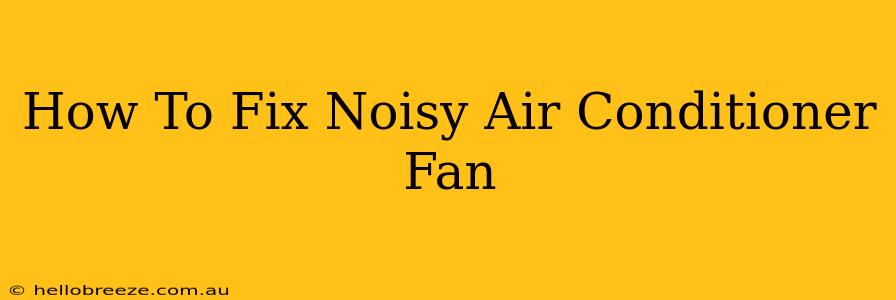Is your air conditioner fan making more noise than usual? A noisy AC fan can be incredibly annoying, disrupting your peace and quiet, and potentially indicating a more serious problem. This comprehensive guide will walk you through the common causes of a noisy AC fan and provide practical solutions to get your system running smoothly and quietly again.
Identifying the Source of the Noise
Before you start troubleshooting, pinpoint the exact type of noise your AC fan is making. This will help you narrow down the potential causes:
- Squealing or Screeching: This often points to friction between moving parts, likely due to a lack of lubrication or worn-out bearings.
- Rattling or Clicking: Loose components, such as fan blades or motor mounts, are usually the culprits.
- Humming or Buzzing: This could indicate electrical issues within the motor or problems with the capacitor.
- Whistling or High-Pitched Sounds: These sounds might be caused by airflow restrictions or issues with the fan blades themselves.
Common Causes and Solutions for a Noisy AC Fan
Here's a breakdown of the most frequent causes of noisy air conditioner fans and how to address them:
1. Lack of Lubrication
Problem: The fan motor's bearings may be dry, causing friction and squealing. This is especially common in older units.
Solution: Many AC fans have oil ports designed for lubrication. Consult your AC's manual to identify these ports (if present) and the recommended type of oil. Apply a few drops of oil to the designated ports. Caution: Using the wrong type of oil can damage your unit.
2. Worn-Out Bearings
Problem: Over time, bearings wear down and become less effective, resulting in increased noise and potential motor failure.
Solution: Replacing worn-out bearings is a more involved repair and often requires technical expertise. It's best to contact a qualified HVAC technician for this repair.
3. Loose Fan Blades
Problem: Loose fan blades can vibrate against the housing, creating a rattling or clicking sound.
Solution: Carefully inspect the fan blades and their mounting screws. Tighten any loose screws. If the blades themselves are damaged or bent, they may need replacement.
4. Debris Buildup
Problem: Dust, leaves, or other debris can accumulate on the fan blades or within the motor housing, causing increased friction and noise.
Solution: Turn off the power to your AC unit before attempting any cleaning. Use a soft brush or vacuum cleaner with a brush attachment to carefully remove any debris from the fan blades and motor housing.
5. Motor Problems
Problem: A failing motor can produce a variety of noises, including humming, buzzing, or grinding.
Solution: Motor problems are typically more complex and require professional assistance. A faulty motor may need to be replaced by a qualified HVAC technician.
6. Airflow Restrictions
Problem: Blockages in the air vents or ductwork can restrict airflow, increasing the strain on the fan motor and causing increased noise.
Solution: Check your air vents and ensure they're free from obstructions. Inspect the ductwork for any blockages.
When to Call a Professional
While some minor adjustments can be performed independently, certain issues necessitate the expertise of a qualified HVAC technician. Contact a professional if:
- You're uncomfortable working with electrical appliances.
- The noise persists after trying basic troubleshooting steps.
- You suspect a serious motor problem.
- Your AC unit is under warranty.
Regular maintenance, including cleaning and lubrication, can significantly extend the life of your air conditioner and prevent noisy fan issues. By following these troubleshooting tips, you can often identify and fix the problem yourself, ensuring a cool, quiet, and comfortable home.

